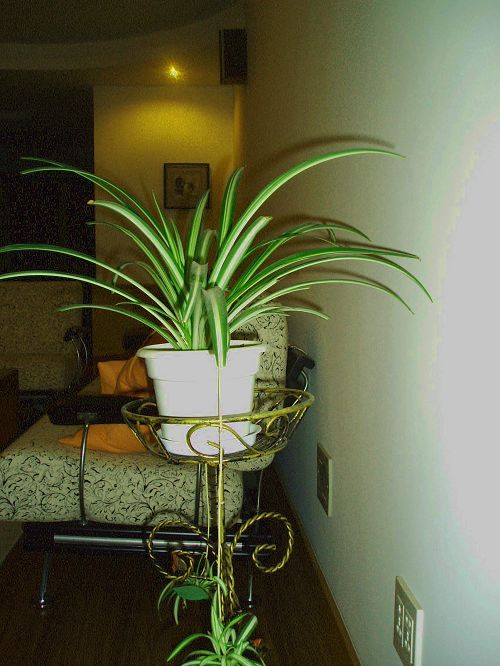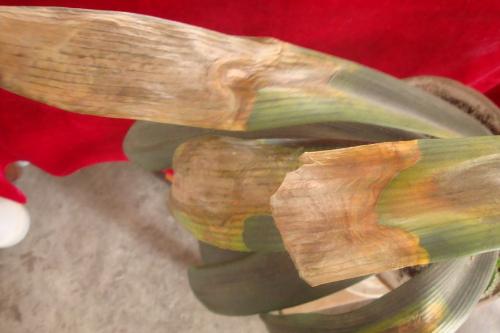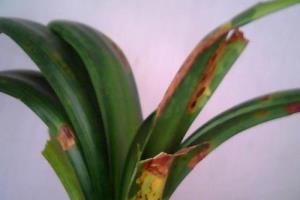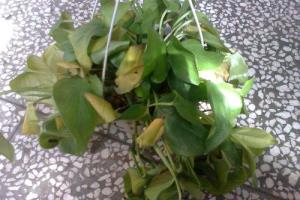The leaves of Cymbidium are yellow.
The reason for the yellowing of the leaves of Cymbidium

One of the main reasons are: first, the application of unfermented fertilizer. Cause germs to multiply in the basin soil. Second, the basin soil has not been changed for a long time, and there are pathogenic bacteria in the old soil. Third, the new soil has not been fully fermented. Second fermentation in a basin. Fourth, fertilizer nitrogen, phosphorus, potassium imbalance, especially less potassium fertilizer or fertilization caused by fertilizer direct contact with the root. Different methods should be taken to prevent and cure the disease according to the specific reasons. The fertilizer must be fully fermented, the concentration of fertilizer should be small, nitrogen, phosphorus and potassium should be balanced, and the fully fermented nutrient soil should be changed twice a year in spring and autumn without raw soil. In this way, the occurrence of the disease can be stopped.
The main symptoms of leaf yellow disease are that a leaf turns yellow locally, the part of the yellow leaf is irregular, and the tip of the second leaf turns yellow and gradually spreads to the pseudobulb. The third false bulb first yellowed and gradually spread to the leaf tip, and fourth, the whole leaf turned yellow from the bottom to the end at the same time. The first situation is caused by sunburn on the leaf surface, cold wind, local spread of germs bitten by pests such as slugs and snails, or enlarged wounds after trauma. The reason why the leaf tip yellowed first was that the rotten root interrupted the nutrient supply of the leaf, and began to turn yellow from the leaf tip to the pseudobulb. Or fat and thick use of raw soil or poor soil quality can cause this phenomenon. The reason for the third situation may be that insect pests bite the leaves of the pseudobulb and make it gradually expand to the tip or stagnant water at the pseudobulb in summer and bacteria breed local yellow leaves here. And gradually spread. It is more common for the whole leaf to turn yellow at the same time, and the cause is also more complicated, mainly due to improper management. Such as poor ventilation in summer, excessive fertilization, root problems and so on may make the leaves turn yellow as a whole. The preventive measures are, first of all, to prevent the rotten roots of the plant, so that the leaves can get adequate nutrition, and then to put an end to trauma and prevent the wound from spreading, the amount of fertilizer applied must be well controlled, and hypertrophy must be avoided. Adult flowers in summer should not water the false bulbs, pay attention to ventilation in summer, cool down and strengthen management. Regularly spray carbendazim, chlorothalonil, methyl tobu, agricultural streptomycin and other sterilization drugs for prevention and control. That is, it can reduce the occurrence of leaf spot disease and leaf yellow disease.

Second: there are leaf spots on the leaves of Cymbidium, except for the normal growth physiological law of yellow leaves, that is, the general leaves survive on the plant for about 3 years, and the old leaves turn yellow and age and fall off naturally, which has no side effects on the plants. this is the natural process of normal growth and metabolism of Cymbidium, but it is abnormal for new leaves to appear leaf spots and yellow leaves in time.
The main symptom of leaf spot disease is that yellow or brown dots appear on the leaf surface, and then the color of the spot deepens gradually, and the festering area of the spot gradually expands, so that the leaf or the whole plant rots away.
The main causes of leaf spot disease are: first, the application of fertilizer that is not fermented well. Cause germs to multiply in the basin soil. Second, the basin soil has not been changed for a long time, and there are pathogenic bacteria in the old soil. Third, the new soil has not been fully fermented. Second fermentation in a basin. Fourth, fertilizer nitrogen, phosphorus, potassium imbalance, especially less potassium fertilizer or fertilization caused by fertilizer direct contact with the root. Different methods should be taken to prevent and cure the disease according to the specific reasons. The fertilizer must be fully fermented, the concentration of fertilizer should be small, nitrogen, phosphorus and potassium should be balanced, and the fully fermented nutrient soil should be changed twice a year in spring and autumn without raw soil. In this way, leaf spots can be prevented.
The main symptoms of leaf yellow disease are that a leaf turns yellow locally, the part of the yellow leaf is irregular, and the tip of the second leaf turns yellow and gradually spreads to the pseudobulb. The third false bulb first yellowed and gradually spread to the leaf tip, and fourth, the whole leaf turned yellow from the bottom to the end at the same time. The first situation is caused by sunburn on the leaf surface, cold wind, local spread of germs bitten by pests such as slugs and snails, or enlarged wounds after trauma. The reason why the leaf tip yellowed first was that the rotten root interrupted the nutrient supply of the leaf, and began to turn yellow from the leaf tip to the pseudobulb. Or fat and thick use of raw soil or poor soil quality can cause this phenomenon. The reason for the third situation may be that insect pests bite the leaves of the pseudobulb and make it gradually expand to the tip or stagnant water at the pseudobulb in summer and bacteria breed local yellow leaves here. And gradually spread. It is more common for the whole leaf to turn yellow at the same time, and the cause is also more complicated, mainly due to improper management. Such as poor ventilation in summer, excessive fertilization, root problems and so on may make the leaves turn yellow as a whole. The preventive measures are, first of all, to prevent the rotten roots of the plant, so that the leaves can get adequate nutrition, and then to put an end to trauma and prevent the wound from spreading, the amount of fertilizer applied must be well controlled, and hypertrophy must be avoided. Adult flowers in summer should not water the false bulbs, pay attention to ventilation in summer, cool down and strengthen management. Regularly spray carbendazim, chlorothalonil, methyl tobu, agricultural streptomycin and other sterilization drugs for prevention and control. That is, it can reduce the occurrence of leaf spot disease and leaf yellow disease.
Related
- Wuhan Hospital Iron Tree Blooming Result Was Instantly Frightened by the Gardener Master
- Which variety of camellia is the most fragrant and best? Which one do you like best?
- What is the small blue coat, the breeding methods and matters needing attention of the succulent plant
- Dormancy time and maintenance management of succulent plants during dormancy
- Minas succulent how to raise, Minas succulent plant pictures
- What are the varieties of winter succulent plants
- How to raise succulent plants in twelve rolls? let's take a look at some experience of breeding twelve rolls.
- Attention should be paid to water control for succulent plants during dormant period (winter and summer)
- Watering experience of twelve rolls of succulent plants
- Techniques for fertilizing succulent plants. An article will let you know how to fertilize succulent plants.



